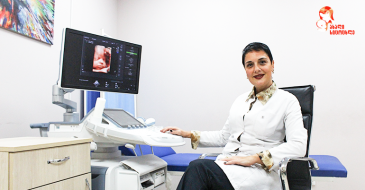The summer, the time of vacation, is coming. The journey is always accompanied by a pleasant mood, new adventures, fun, and cheerfulness.
Modern life is impossible to imagine without travel. There are certain recommendations that need to be taken into account for a future mother to ensure a safe journey for her and the fetus.
The head of the outpatient department of the clinic of the National Center of Surgery "New Life", an obstetrician-gynecologist Tatia Tskhomelidze talks about this topic.
As Dr. Tatia said in an interview with us, if the pregnancy proceeds without complications, the flight is safe and does not affect the fetus adversely. Of course, it is always better to consult a personal doctor before taking a flight and have a health certificate with you.
"If there is a history of venous thromboembolism, extragenital diseases, age> 35 years, three or more births, obesity (BMI> 30 kg / m2) before pregnancy or at the beginning of pregnancy, smoking, marked varicose veins and other risk factors, which increase the risk of pooling of blood in the lower extremities with prolonged flight. Generally, the studies don’t reveal enough data that the flight during pregnancy increases the risk of thromboembolic complications. However, it is known that after a long flight (a flight more than 4 hours) the frequency of venous thromboembolism is 1/400 - 1/10 000, because, during normal pregnancy, a number of changes occur in the body, including the coagulation system of the blood so the pregnancy is accompanied by the state of hypercoagulation, therefore, it is necessary to assess correctly the risk of venous thromboembolism during the antenatal visit. It is worth mentioning that the risk of developing such complications may be higher in pregnant women with a complicated history. Therefore, the doctor should evaluate these risk factors at the first visit of the pregnant woman and give appropriate recommendations, "explains Dr. Tatia.
-Which considerations should be taken into account by pregnant women during the flight?
- You should always consult with your doctor before traveling or flying. The most dangerous and undesirable complication that flight can cause is the risk of thromboembolism, so we must prevent this. There are many simple tips for pregnant women.
In the low-risk group, pregnant women the prevention of thromboembolism includes 2 basic and simple steps - prevention of dehydration and activation. During the flight, try to consume a large amount of fluid, it is better to consume drinking water (1-1.5 liters). Take a walk at least every 1 or 2 hours through the salon. It is recommended to use compression stockings during prolonged flight.
Recommendations:
- Wear sportswear and comfortable shoes;
- Remove your shoes during the flight;
- Avoid heavy and excessively greasy foods during the flight.
- What is the maximum flight time recommended for the pregnant women?
- During pregnancy, the fetus is well protected in the uterus, the mother is a good "incubator" for him/her. Uterus, pelvic bones, and abdominal cavity protect the child well, but it is better to avoid long, tiring and uncomfortable travel. As for the flight, it is desirable to fly less than 4 hours.
- Up to what time is it possible for the pregnant women to fly?
- In most cases, the pregnant women avoid flights mainly in the first trimester, because at this time they feel very uncomfortable (fatigue, vomiting, frequent urination).
In addition, it is better to agree with a particular airline about the dates of pregnancy, because each company has its own policy about the pregnant women. In the case of the uncomplicated, single-fetal pregnancy, the long-distance flight is allowed up to 36 weeks of pregnancy, with the health certificate issued by the doctor.
Most airlines require a health certificate of a pregnant woman above 28 weeks.
The best period for traveling by plane is the second trimester of pregnancy.
We can not state the absolute recommendations and terms, but it is desirable to restrain from flying in the last weeks of pregnancy (34-35 weeks or more).
Once again, if the pregnancy is physiological and uncomplicated, if you follow the above-mentioned advice, there will be no special risk for pregnant women and the fetus because of the pressure drop during the flight,
- Travel by car, bus, train. Tell us more about the travel by these modes of transport.
- Always fasten the seat belt in the car. Pay attention that the belt does not compress the stomach. If you have a toxicosis, traveling by car can exacerbate the feeling of nausea.
Traveling by train is safer, and you can travel without restriction. However, it is not recommended to sleep on the top shelf.
- One of the components of a safe trip is the seat belt. When the stomach is big, how is the pregnant woman supposed to fasten it?
-Please, try not to drive in the last weeks of pregnancy. Always fasten the seat belt and make sure it doesn’t compress the belly. Place its lower part below the abdomen and the upper part over the abdomen. It is advisable to keep the stomach away from airbags. If you are the driver, please, stay calm.
The clinic “New Life” address: Tbilisi, Digomi Lubliana street №21a
You can contact the Call-center of the clinic “New Life” at 577 05 99 00;
If you have some questions, you can contact the obstetrician-gynecologist of the clinic “New Life” Tatia Tskhomelidze at 577 11 91 00;
Wish you health!








